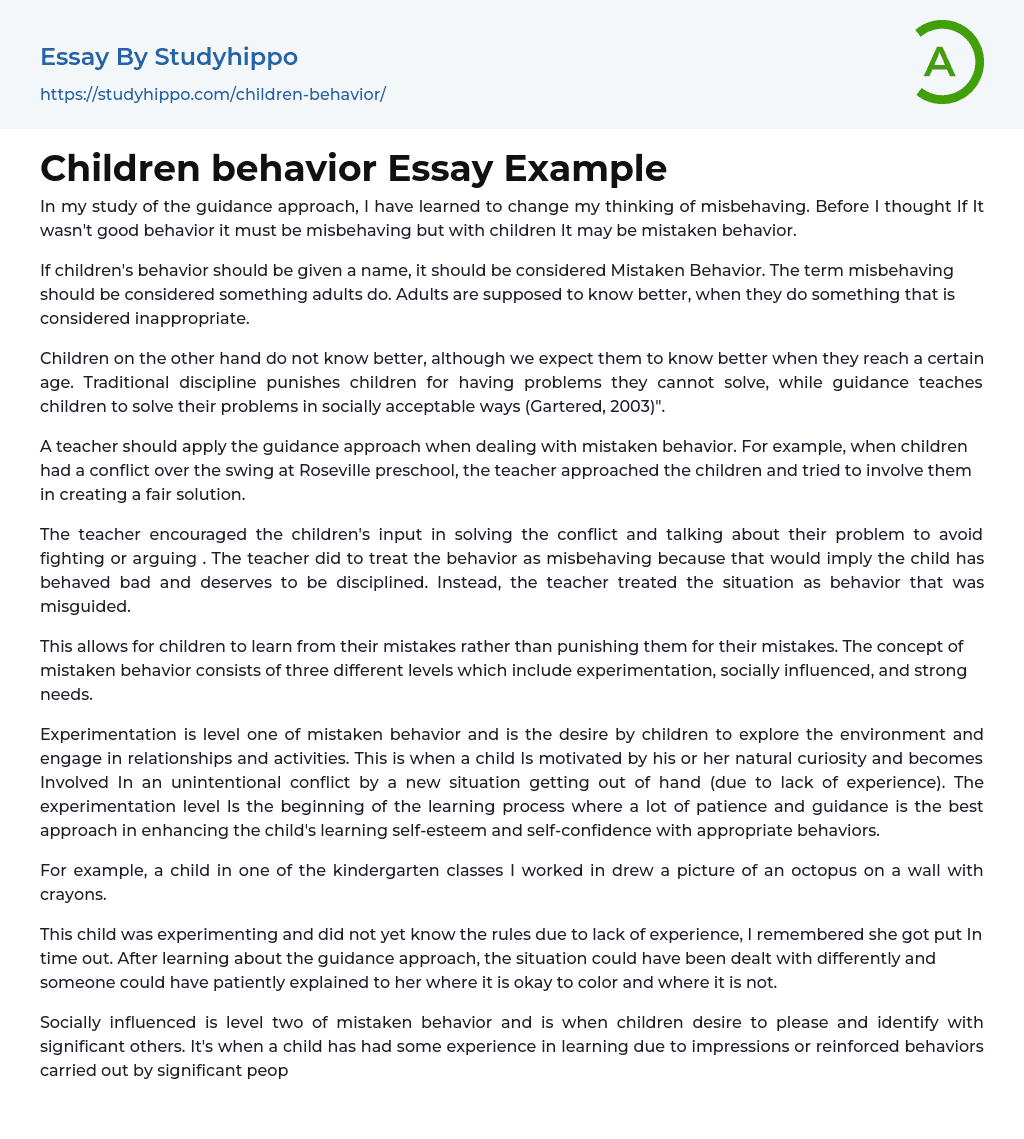Through studying the guidance approach, my perspective on misbehavior has shifted. Previously, I classified any behavior as misbehavior if it wasn't deemed good. However, I now recognize that with children, it might just be an instance of misunderstood behavior.
Children are not knowledgeable, although they are expected to be at a certain age. The conventional discipline penalizes them for issues beyond their capabilities, while guidance trains them to deal with their problems through socially acceptable means (Gartered, 2003).
The educator motivated the youngsters to participate in managing conflicts and communicating their concerns to prevent physical altercations or verbal disputes. The instructor refrained from categorizing the conduct as improper since that would suggest that the pupil acted wrongly and warrants punishment. Rather, the instructor viewed the incident as behavior that needed guidance.
During the initi
...al stage of misguided behavior, children are naturally curious and explore their surroundings through relationships and activities. This experimentation is crucial for learning but may result in unintentional conflicts due to unfamiliarity with new situations. Patience and guidance should be provided during this phase to help children develop self-esteem, self-confidence, and appropriate behaviors.
An illustration of an octopus was created on a wall with crayons by a child in one of the kindergarten classes where I was employed.
The second level of mistaken behavior is known as socially influenced, wherein children aim to please and connect with important individuals. It involves a child's exposure to learning through the actions or attitudes of influential people in their life, including unintentional sources like cartoon characters, video game heroes, siblings, neighbors, caregivers, teachers, and parents. My daughter recounted a story about a socially influenced
child.
During her babysitting session at my husband's workplace, there were four children. However, one child, who refused to share toys or food, monopolized everything. When my daughter requested that he share, he retorted that his mother had said he did not have to since he was "first class". This incident exemplifies social influence on children's behavior which highlights the importance of understanding rules and procedures through group meetings (Gartered, p.14, 2004). Socially influenced mistreatment of expletives in class signifies that a child is imitating adult behavior. Finally, level three of mistaken behavior manifests as strong needs, which can arise from health conditions and life experiences preventing a child from being equipped to deal with problems.
The escalation of behaviors over time requires prompt action to identify the causes and manage them effectively. While on the playground, I observed a child who had migrated from Russia and was unable to communicate in English. Despite her efforts, she could not interact with teachers or other children, causing growing frustration that resulted in a tantrum. It is crucial to resolve such issues for a child's healthy development and capacity to handle similar situations constructively in the future.
- Perseverance essays
- Expressive essays
- Character Traits essays
- Apology essays
- Compassion essays
- Self Assessment essays
- Self Evaluation essays
- Immigration Reform essays
- Adult essays
- Aggression essays
- Altruism essays
- Archetype essays
- Behavior essays
- Certainty essays
- Conformity essays
- Deception essays
- Human Behavior essays
- Human Sexuality essays
- Maturity essays
- Morality essays
- Obedience essays
- Procrastination essays
- Reinforcement essays
- Role Model essays
- Child essays
- Child labor essays
- Childcare essays
- Attitude essays
- Goals essays
- Personal Goals essays
- Personal Life essays
- Personality essays
- Principles essays
- Reputation essays
- Self Awareness essays
- Self Esteem essays
- Self Reflection essays
- Self Reliance essays
- Strengths essays
- Value essays
- Values essays
- Weakness essays
- Who Am I essays
- Classroom essays
- College essays
- E-Learning essays
- Elementary School essays
- Examination essays
- Graduate School essays
- High School essays




